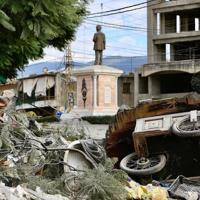Israel faces criticism from European countries over its campaign in Lebanon – World News

BRUSSELS
Israel is under heavy criticism from several European countries over its operation in Lebanon and a series of fires on the United Nations peacekeeping force, UNIFIL.
EU nations with peacekeepers in Lebanon expressed “the shared will to exert maximum political and diplomatic pressure on Israel” to prevent further “incidents” against the U.N. mission, Italy said on Oct. 16.
“At the same time, it was made clear that Hezbollah cannot use UNIFIL personnel as a shield in the conflict.”
Italian Prime Minister Giorgia Meloni, who is to visit Beirut today, has strongly condemned the attacks on UNIFIL, which includes a significant number of Italians.
The countries expressed the need to “review the rules of engagement… to allow UNIFIL to operate more effectively and safely.” Ministers from France, Italy, Spain, Austria, Croatia, Finland, Greece, Ireland, Latvia, the Netherlands, Poland, Germany, Estonia, Hungary, Malta and Greek Cyprus took part in the meeting.
Late on Oct. 16, U.N. peacekeepers reported another attack as Israeli forces have fired at one of their positions in the south in a “direct and apparently deliberate” attack that damaged a watchtower.
Unease grows within France over Macron comments
On the other hand, French President Emmanuel Macron’s comments that Israel owes its existence to a U.N. resolution have sparked unease in France, with the president given a furious rebuke by the upper house speaker but also facing disquiet from within his own ranks.
The remarks attributed to Macron during a cabinet meeting that Israel needed to adhere to U.N. resolutions in its campaigns in Lebanon and Gaza as the Israeli state was created by the world body have angered Israeli Prime Minister Benjamin Netanyahu. Netanyahu has hit back at Macron, saying the country’s founding was achieved by the 1948 Arab-Israeli war, not a U.N. ruling.
But there has also been a strong reaction within France, home to Europe’s largest Jewish community, with Jewish groups, political heavyweights and even Macron allies speaking out against the comments.
Macron further strained tense relations with Israel with the comment.
This came after Macron’s calls for a halt on arms deliveries to Israel, as the French president strongly criticized Israel’s decision to send its troops to Lebanon.
In another row, British Prime Minister Keir Starmer said that London is considering sanctioning Israeli Finance Minister Bezalel Smotrich and National Security Minister Itamar Ben Gvir over comments they made about civilians in Gaza and West Bank settlers.
Starmer was responding to a question about Smotrich’s comments that starving civilians in Gaza might be justified and Ben Gvir’s remarks that perpetrators of settler violence in the West Bank were heroes.
“We are looking at that because they’re obviously abhorrent comments,” the prime minister said.
Meanwhile, German Foreign Minister Annalena Baerbock has acknowledged that Berlin received a letter from Israel promising to adhere to “international humanitarian law” when using German-supplied arms.
Chancellor Olaf Scholz defended his government’s decision to resume arms exports to Israel.
Related
A New Book Argues That What Happens in Europe Doesn’t…
Remaking the World: European Distinctiveness and the Transformation of Politics, Culture, and the Economy by Jerrold Seigel “No issue in world
Poland plans military training for every adult male amid growing…
Poland’s prime minister, Donald Tusk, has said his government is working on a plan to prepare large-scale military training for every adult male in response t
2025 European Athletics Indoor Championships: Ditaji Kambundji secures women’s 60m…
Switzerland’s Ditaji Kambundji walked away from the 2025 European Athletics Indoor Championships in Apeldoorn on 7 March with much more than her first Europea
Takeaways from the EU’s landmark security summit after Trump said…
BRUSSELS (AP) — European Union leaders are trumpeting their endorsement of a plan to free up hundreds of billions of








